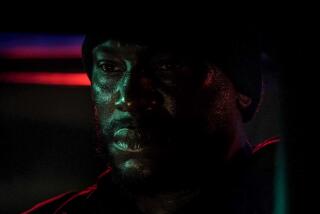‘RAMBO’S’ RIGHT-WING REVISIONS
- Share via
It is probably the Original Sin of film critics to read more into a film than was ever there. At very least it is an occupational obsession to insist that, in movies as in the hula, every little movement has a meaning.
If there is portent in the fall of a sparrow, there is a thrust of phallic overtone in a loaf of bread and a whole volume of autobiography in the little boy cuffed. Clint Eastwood recently complained that over-readers were a pain in his existence.
But the critics aren’t wrong to be on the alert for meaning. Films reflect their times whether they intend to or not, just as they reflect the conscious or subconscious states of their creators. It would be crazy to imagine that Hitchcock’s merry frights and imperilled innocents did not somehow arise in the private man.
What is far trickier is to speculate just how much the wide audience--which is not paid to nitpick but pays to be entertained--picks up on the points films are making, beyond the stories they are telling.
“Rambo: First Blood Part II” is the preeminent case in view at the moment. It was, at last glance, the largest-grossing film of the summer, with legs as muscular as Sylvester Stallone’s own. What does the audience hear, beyond the gunfire?
At the most obvious level, it is an ultraviolent adventure whose detonations and deaths are non-stop. (I tried a body count the other afternoon but gave up after two dozen because there was no reliable way even to estimate how many fell to the bombs, rockets and perpetual-load automatic weapons. The deaths by knife and steel arrow were easier to assess. I can’t believe the full toll is less than 100.)
But “Rambo” is also a message picture, and a very hateful message it is as I read it, reaffirming the hard-line, right-wing doctrine that the United States could have won the war in Vietnam had not the troops been betrayed by faint-hearted and probably corrupted politicians and bureaucrats at home.
“Rambo” is a film of betrayal. While there are some pulp-fiction sadistic Russians and vicious Asians left over from “The Deer Hunter,” the principal villain is an American, a civilian bureaucrat--agency not specified--willing to sacrifice Rambo when his mission succeeds too well, and quite prepared to put under house arrest the decent Special Forces officer whose loyalties are to Rambo.
“Do we get to win this time?” Stallone as Rambo asks.
‘This time it’s up to you,” Richard Crenna, as his old CO, replies. Crenna later tells the bureaucrat that Rambo has gone out to win the war “others have lost.”
The “stinking bureaucrat,” as Crenna later calls him, says Vietnam wasn’t his war; he’s just trying to clean up the mess--by using Rambo as a dupe to provide false evidence that there are no Vietnam War GIs still being held prisoner. (Rambo finds that there are, thus confirming another item of conservative political gospel.)
“First Blood,” to which “Rambo” is a sequel, was about the plight of the returned Vietnam War veteran, insufficiently honored and tended-to, and even resented, by his country. Rambo, seeking a ‘Nam buddy who has died of Agent Orange, was stranded in a catastrophically hostile town governed by a storybook nasty sheriff, and undertook the first of his one-man wars against overwhelming odds.
In a tremulous curtain speech in the new film, Rambo, having spared the bureaucrat’s life but scared the living cynicism out of him, says that all he wants is for the country to love the Vietnam GIs as much as they loved their country. There is no doubt of the passionate sincerity of the speech (Stallone wrote the film with James Cameron) and it does link the original and the sequel thematically. The difficulty is that “Rambo” is not about that, but about Vietnam as a tale of brave men betrayed by weak men.
The question is how much heed the audience pays to the theme, as against the shoot-’em-up heroics, of “Rambo.” Many in the audience will not have been born during the heat of the Vietnam convulsion in this country in the late 1960s. Others will have only hazy grade-school memories. Does “Rambo” then double as a history text?
The national consensus, achieved with pain, bitterness, and an assist from the grim evidence of the television newscasts, was that victory could not have been achieved at a price a civilized people was prepared to pay. Vietnam has seemed an enduring lesson against entangling involvements. But “Rambo” seems in turn a revisionist view, or perhaps a particular view here recycled, of the Vietnam past.
The estimable Pauline Kael insists that audiences regard “Rambo” as a hoot, and laugh at the screen. East of 5th Avenue and west of La Cienega this may be so. I caught up with “Rambo” at a sparse afternoon screening (west of La Cienega) that produced no responses at all, although I thought I heard a muffled bark of exasperation at the end. (You never know who’s listening.)
As a believer in the communicative power of the movies, I’m less confident than Kael that nobody takes “Rambo” seriously. Preposterous though the film may be, and is, with its paper-thin characterizations, its grunting dialogue and its sledgehammer simplification of an enormously complicated moment in history, it is a large, expert production with a laconic superhero and the sure-thing appeal of loner against mob.
It is comforting to think that the theme has merely been borrowed for the uses of commerce, and that the audience understands this, and goes to this movie, as to others, for diversion, not enlightenment.
But it is also possible to see “Rambo” as speaking to an audience eager to rewrite the past and reject what might have been regarded as a hard lesson of history. It is a conservative message aimed at what can be widely interpreted as a conservative time. What ARE those grosses saying?
Then again, perhaps it is true that “Rambo” isn’t taken seriously. I would be glad to think so, but I don’t.
More to Read
Only good movies
Get the Indie Focus newsletter, Mark Olsen's weekly guide to the world of cinema.
You may occasionally receive promotional content from the Los Angeles Times.










